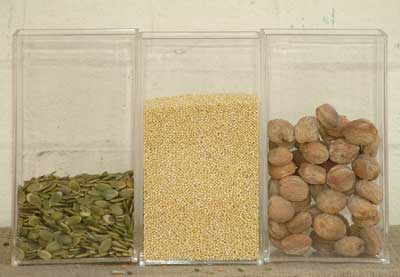Nanakusa no sekku is the Festival of Seven Herbs, a symbolic meal celebrating the arrival of spring and consisting of a rice porridge with seven of the early arrivals of the season, including seri, nazuna, gogyō, hakobera, hotokenoza, suzuna and suzushiro.
Shepherd’s purse. The seeds, leaves, and root of shepherd's purse are edible. It is a rather scraggy plant which grows wild. In Greece it is used to bulk up dishes in the absence of other greens. In Korea the roots may be used in the traditional vegetable dish of namul. In Japan it is included as one of those early spring vegetables in a symbolic special festival called nanakusa-no-sekku. And it is routinely used stir fried with rice cakes or as an ingredient in wontons in the Jiangnan region of China.
.jpg)
is a cross between a sandwich and onigiri (seasoned rice ball). Proteins, such as fish roe, egg, and
tofu, cooked and raw seafood, cooked chicken, beef, and pork and vegetables are
sandwiched between two patties of sushi rice along with condiments, such as
mayonnaise and ketchup, centered in a sheet of nori (dried seaweed), which is then
wrapped around the ingredients and the neat square package is then sliced in half. Relatively new as a food item, it is
rapidly becoming very popular, not only in Japan, but also worldwide. Onigirazu is easily handled and convenient as a
“take away” meal and is a popular bento/lunch
box item.

Finger millet. After rice and wheat, finger millet, with pearl millet, is the most important grain crop of India. It is used to make flour. Finger millet is often intercropped with legumes such as peanuts (Arachis hypogea), cowpeas (Vigna sinensis), and pigeon peas (Cajanus cajan), or other plants such as Niger seeds (Guizotia abyssinica).
Tekka is a condiment that consists of sesame seeds and a number of root vegetables (greater burdock roots, carrots, ginger root and lotus root) finely grated and stir-fried in sesame oil and boiled with hatcho (soya bean) miso, until it is reduced down to a concentrated powder. Traditional preparation time used to be 16 hours (on a low fire), yet speedier preparation is possible. As the flavour is so powerful it only needs to be used in small amounts and is usually sprinkled over cooked grains, noodles, potatoes, vegetables or salads.